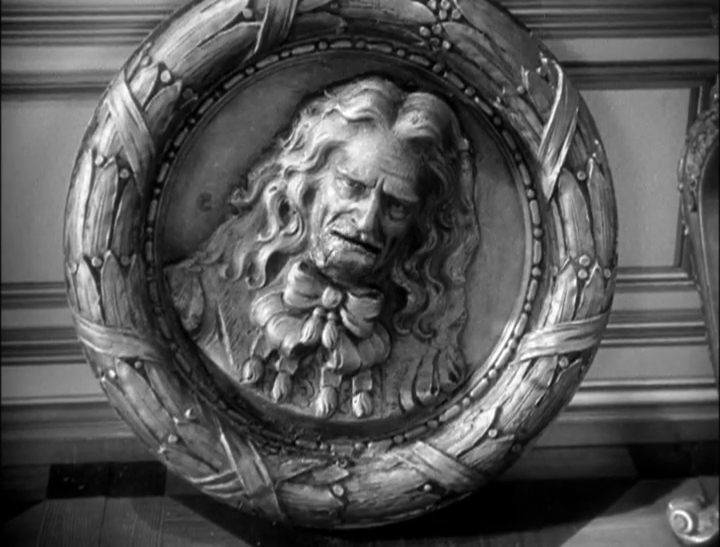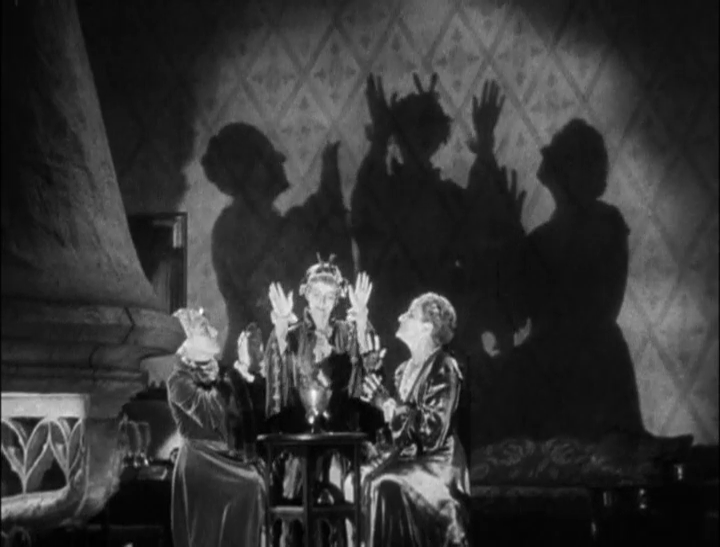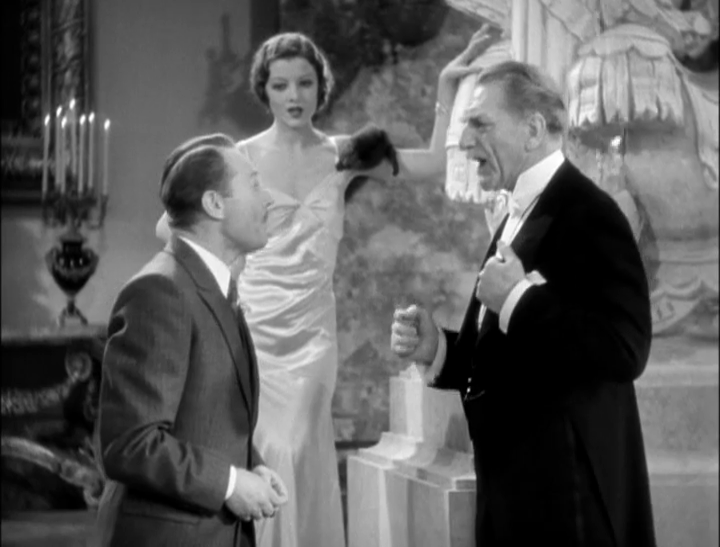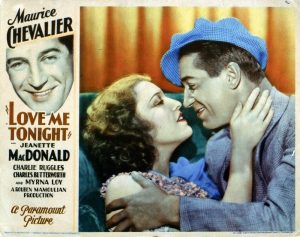|
Genres:
- Cross-Class Romance
- Jeanette MacDonald Films
- Love Triangle
- Maurice Chevalier Films
- Mistaken or Hidden Identities
- Musicals
- Myrna Loy Films
- Romantic Comedy
- Rouben Mamoulian Films
- Royalty and Nobility
Review:
There’s much to enjoy about this delightful Rogers and Hart romantic comedy, directed with flair by Rouben Mamoulian and considered a cinematic musical breakthrough given Mamoulian’s seamless integration of lyrics into the storyline. The film’s opening sequence — in which a small town outside of Paris slowly comes to life in the morning, eventually forming an ad hoc orchestra of synchronized found-sounds — is worthy viewing on its own, and nicely kicks off the entirely serviceable storyline of a good-natured tailor (Chevalier) whose generosity lands him in trouble with his fellow tradespeople, and forces him to seek immediate renumeration from Ruggles. Love Me Tonight‘s pre-Code credentials are clearly in view throughout, ranging from Loy’s blunt sexual desires (“Tell me, do you ever think of anything but men, dear?” “Oh, yes.” “Like what?” “Schoolboys.”) to many of Rodgers and Hart’s lyrics, such as during the opening sequence:
Chevalier: How’s your bakery?
Baker’s Wife: I need a beau.
Chevalier: Where’s your husband?
Baker’s Wife: He needs the dough!
Meanwhile, during the iconic ditty “Isn’t it Romantic?”, Chevalier sings:
Kiddies are romantic, and if we don’t fight, we soon will have a troop!
We’ll help the population — it’s a duty that we owe to France!
Later, as Princess Jeanette is wooed by a dogged but boring older suitor (Charles Butterworth), double-entendres and word-play abound:
Butterworth: Princess! Jeanette!
MacDonald: Count, I’m going to bed!
Butterworth: I’ve just come up to join you.
MacDonald: Join me?
Butterworth: Join you in a little chat before dinner.
[Later, after Butterworth retreats and falls]
Butterworth: I’ll never be able to use it again!
MacDonald: Oh, Count, did you break your leg?
Butterworth: No, I fell flat on my flute!
And so on and so on; the script and lyrics are chock-a-block full of amusing sexual inferences and references. The film is also visually innovative throughout. As noted by DVD Savant:
In [one] song, the dog pipes up with a note (in the right key!) and even a bas-relief on the wall chimes in with a lyric. Yet another tune plays out over an image of Maurice sleeping in his bed. An image of the sleeping Jeanette dissolves in next to him, forming a literal pre-echo of a visual motif in 1959’s Pillow Talk… We’re surprised when a zoom lens is used to zero in on a smokestack in the first scene, and even more intrigued to see a mounted hunting party ‘leave quietly’ by galloping away in slow motion. Almost every scene introduces something new.
Definitely check this one out; it’s my favorite Chevalier-MacDonald film by far.
Redeeming Qualities and Moments:
- The delightfully creative opening sequence

- Innovative cinematic techniques

- Victor Milner’s cinematography



- Refreshingly risque and humorous Pre-Code content

- Rodgers and Hart’s soundtrack
Must See?
Yes, as a fine early musical. Listed as a film with Historical Importance and a Personal Recommendation in the back of Peary’s book.
Categories
(Listed in 1001 Movies You Must See Before You Die)
Links:
|







One thought on “Love Me Tonight (1932)”
Not must-see for the average film fanatic, though it will definitely hold interest for those who have a fondness for this type of operetta.
Dated in its style of romanticism, the film (as noted) does gain points for the way it dances around the censors of the day – and (as also noted) for Mamoulian’s visual examples of innovation.
But, for my own taste, some of it is stretched beyond enjoyment, esp. the opening and closing musical numbers; less would be more. And basically it seems that the film was probably fresher in its approach in its day than it is now. Specifically, the ‘marrying the commoner’ bit is more than a bit tired.
On the plus side: more than Chevalier and MacDonald (who both fall somewhat prey to being garden-variety lovers), I found myself paying more attention to the steady flow of spontaneity flowing from Loy, Ruggles and Smith (who gives us a surprisingly delightful reprise of ‘Mimi’).